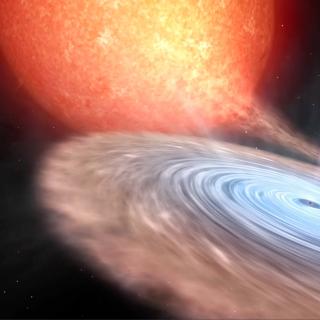Bibcode
Jiménez-Ibarra, F.; Muñoz-Darias, T.; Wang, L.; Casares, J.; Mata Sánchez, D.; Steeghs, D.; Armas Padilla, M.; Charles, P. A.
Referencia bibliográfica
Monthly Notices of the Royal Astronomical Society, Volume 474, Issue 4, p.4717-4722
Fecha de publicación:
3
2018
Número de citas
6
Número de citas referidas
6
Descripción
We present a detailed spectroscopic study of the optical counterpart of
the neutron star X-ray transient Aquila X-1 during its 2011, 2013 and
2016 outbursts. We use 65 intermediate resolution GTC-10.4 m spectra
with the aim of detecting irradiation-induced Bowen blend emission from
the donor star. While Gaussian fitting does not yield conclusive
results, our full phase coverage allows us to exploit Doppler mapping
techniques to independently constrain the donor star radial velocity. By
using the component N III 4640.64/4641.84 Å, we measure
Kem = 102 ± 6 km s-1. This highly
significant detection (≳13σ) is fully compatible with the
true companion star radial velocity obtained from near-infrared
spectroscopy during quiescence. Combining these two velocities we
determine, for the first time, the accretion disc opening angle and its
associated error from direct spectroscopic measurements and detailed
modelling, obtaining α = 15.5 ^{+ 2.5}_{-5} deg. This value is
consistent with theoretical work if significant X-ray irradiation is
taken into account and is important in the light of recent observations
of GX339-4, where discrepant results were obtained between the donor's
intrinsic radial velocity and the Bowen-inferred value. We also discuss
the limitations of the Bowen technique when complete phase coverage is
not available.
Proyectos relacionados

Agujeros negros, estrellas de neutrones, enanas blancas y su entorno local
Los agujeros negros y estrellas de neutrones en binarias de rayos-X son laboratorios únicos para explorar la física de estos objetos compactos. No solo permiten confirmar la existencia de agujeros negros de origen estelar a través de mediciones dinámicas de sus masas, sino que también permiten investigar el comportamiento de la materia y la
Montserrat
Armas Padilla